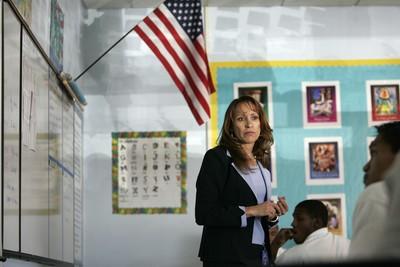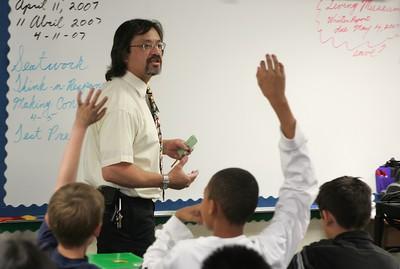LEARNING TO CHANGE
Early morning sunlight streams through her classroom window as Della Salazar, dressed in a navy blue pin-striped suit and black high heels, works to harness the brainpower of Cheyenne High School Spanish students.
Her tools for this job are basically her own mind, a textbook, and vocabulary and grammar exercises cast onto the front wall by an overhead projector.
Eight years ago, when she mined for the millions in gold near Hadley, north of Tonopah, Salazar started her 12-hour workday in the 4 a.m. darkness wearing jeans, work boots and a hard hat.
Her tools for that $65,000-a-year job included a six-story high, $5.8 million electric shovel weighing more than 1.5 million pounds and a 3,400-horsepower mining truck as large as a two-story house that reaches speeds of up to 45 miles an hour.
As she sat at the shovel's controls 30 feet off the ground, Salazar operated equipment powerful enough to dig up enough earth to fill two dump trucks in one scoop.
"I believe what I'm doing now is far more valuable to society, so I can deal with the fact that I'm making about half the money I made in mining," Salazar whispered as her second-year Spanish students worked to complete in-class exercises last week at the North Las Vegas school.
"You can't put a price tag on what I'm doing now, and you won't see the results for years."
Salazar, 46, is part of an emerging trend in the Clark County School District: individuals leaving other careers, often with much higher pay, to become teachers.
"The average age of the teachers we're hiring now is 36," said Byron Green, who with Emily Aguero directs recruitment for the Clark County School District. "That's much different than years ago, when the school district was hiring teachers right out of college at 21 and 22."
Though Green said data is not tracked on the previous career paths of new teachers in the district, he said today's teachers are typically more experienced in the professional world and have more life experience before entering the classroom.
Salazar went back to school in 1999. At UNLV she majored in Spanish and minored in physical education. She received her teaching credential and joined the district in 2004.
For years, according to Kathleen Frosini, director of career and technical education with the district, schools have had the opportunity to capture the talents of people who left technical careers to teach in the same field in which they had experience.
Those numbers are increasing as well, she said.
Administrators are thrilled that their teaching ranks include men and women with a wide range of backgrounds.
Jeffrey Geihs, principal of Cheyenne, said students continue to benefit from those who are committed to teaching right out of college, but noted the growing influx of educators who've changed careers is a boon to education.
"People who come from business tend to be very results oriented," Geihs said. "When I was in the business world, I worked to increase profit margin and that's what I'm doing with student achievement. My student achievement scores are my profit margin, and I'm happy to say the scores are going up because of teachers like Ms. Salazar. She's a phenomenal teacher who comes from a background where you don't last if you don't produce. She's going to get results."
Like Salazar, fifth-grade teacher Jose Trujillo, a former sous-chef, left a profession where he made considerably more money.
Trujillo said he would be "easily making six figures" in the culinary field. But he left the profession for two reasons: He wanted to spend more time with his wife and child and he felt a need to "contribute more to society."
"It wasn't unusual for me to work up to 16 hours a day, six and seven days a week," Trujillo said last week as he took a break from teaching a fifth-grade class at Tomiyasu Elementary School on Annie Oakley Drive.
"I'm still working a lot of hours, but I do get to see my family on weekends and holidays, and I do get to see the light go on when a child gets a concept. It's such a tremendous feeling to see a child finally say, 'Oh,' when he realizes that an equivalent fraction for three-fourths is six-eighths. I didn't get that same kind of feeling from cooking."
Trujillo, who said he is making around $32,000 a year in his fourth year as a teacher, left the culinary field about seven years ago to finish a degree at the University of Nevada, Las Vegas.
He contributed financially to the family then, he said, through substitute teaching.
Without the support of his wife, Angela, also an educator in the school district, Trujillo said he couldn't have switched careers.
"She understood my professional needs and what I wanted for my family," said Trujillo, who works as a substitute teacher during the summer to bring in more money.
"My son is now 10, and I get to spend more time with him as he grows up."
Last week, Trujillo, who wears a tie and sports a neatly trimmed beard and hair to his shoulders, strolled around his classroom and peppered students with questions about the U.S. Constitution.
"If you had to write a new constitution, what would you want to include in it?" he asked.
One student eagerly waved his hand in the air.
"I'd try to include that citizens cannot be spied on by police by hidden cameras at places like stoplights," the youngster said.
"Are you sure you're not being paranoid?" Trujillo replied.
To several students who participated in the discussion, Trujillo hands out what he calls "Trujillo Bucks," a light-green paper kind of currency with the school logo of a dragon it.
The currency can be redeemed at an educational store that he has set up with $500 of his own money.
With 80 "Trujillo Bucks," a student can buy a calculator. Lesser amounts earn colored pencils or notebooks. Students must keep a detailed written record of when and why they were awarded "Trujillo Bucks."
"I learned in business the value of financial incentives," Trujillo said.
After his class on the Constitution, Trujillo is enthusiastic: "I love working with fresh eager minds. Kids at this age really want to learn so I can make a difference."
It is the opportunity to make a difference that makes Salazar, who graduated from UNLV in 2004, eager to leave for school every day.
"I know that if I can teach my students Spanish, I can help them in the global workplace, with some of their family lives, with their college careers," she said. "I have an opportunity most people never get."
"Como pagaste por esos zapatos?" Salazar asked her class recently. Translation: How did you pay for those shoes?
"Pague con cheque personal," one student replied. A personal check.
"Si, Si," Salazar beamed.
One of seven children, Salazar followed her father into the mines. She worked her way up from a laborer to an operator of the heaviest machinery. She grew tired of what she saw as sexual harassment and a lack of promotional opportunities in a male-dominated field.
Using retirement money from her mining work, Salazar, a divorced mother of three, left Hadley to attend UNLV. She also worked part time as a teen director for parks and recreation in Overton.
Her parents, who also lived in the town 50 miles northeast of Las Vegas, helped take care of her children while she attended school.
Without them, Salazar said, she could have never made the move.
A Christian and tri-athlete, Salazar never lets a day go buy without prayer or either swimming, biking or running.
She finds particular comfort in John 10:10, which talks about Jesus promising an abundant life to those who follow him and his teaching.
"What that means to me is that Jesus came so I could have a great life, not just exist," she said after her classes were over for the day.
"And that's what I have now. I have peace, the love of my family, and I have the opportunity to help others have great lives. I am very thankful."


















